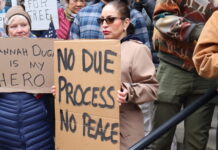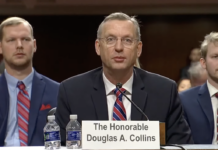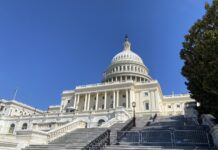
WASHINGTON (GA Recorder) — The U.S. House Jan. 6 committee late Thursday published its findings in a nearly 850-page report that accused former President Donald Trump of inciting an insurrection and recommended Congress consider how to determine whether those found to be insurrectionists should be barred from holding office ever again.
The report caps 18 months of work for the committee, which the House voted to form, mostly along party lines, in June 2021. It details the committee’s central finding, gleaned through records reviews and dozens of interviews with White House, Trump campaign, and other officials, that Trump’s desire to overturn the results of a lawful and legitimate election was the driving factor in the unprecedented attack on the Capitol.
“[P]reventing another January 6th will require a broader sort of accountability. Ultimately, the American people chart the course for our country’s future,” Committee Chair Rep. Bennie Thompson wrote in his foreword to the report.
“The American people decide whom to give the reins of power. If this Select Committee has accomplished one thing, I hope it has shed light on how dangerous it would be to empower anyone whose desire for authority comes before their commitment to American democracy and the Constitution,” the Mississippi Democrat continued.
The report includes criminal referrals to the U.S. Department of Justice for four counts against Trump, including inciting, assisting or aiding an insurrection.
It is the first time in U.S. history a congressional body has recommended to criminally charge — and not simply impeach — a former president.
The panel has no power to actually bring criminal charges and the Justice Department has not said how it will proceed, though Attorney General Merrick Garland appointed special counsel Jack Smith to investigate.
The eight-chapter report chronicles Trump’s “Big Lie,” his and others’ efforts to deliver a fake slate of electors to Vice President Mike Pence, the major events and players involved in the planning of the insurrection, and the committee’s witness interviews and information gathering.
Recommendations for the future
The report also includes recommendations to tweak the nation’s electoral process and guard against future insurrections through legislative action, including amending the Electoral Count Act of 1887 — a proposal that is part of Congress’ year-end government funding deal.
The panel also advises the courts and bar to review the conduct of attorneys who supported Trump’s actions or participated in activities “aimed at subverting the rule of law.”
The report also discusses whether Trump, who has announced he will seek the presidency in 2024, should be prevented from holding office, given his actions on Jan. 6.
It notes that under Section 3 of the 14th Amendment, an individual who takes an oath to protect the Constitution but has “engaged in an insurrection” or given “aid or comfort to the enemies of the Constitution” can be disqualified from holding future state or federal office. The committee points out it referred Trump and others for possible prosecution, that he was impeached in the House, and that 57 senators also voted for impeachment.
“Congressional committees of jurisdiction should consider creating a formal mechanism for evaluating whether to bar those individuals identified in this report under Section 3 of the 14th Amendment from holding future federal or state office,” the report says.
“The Committee believes that those who took an oath to protect and defend the Constitution and then, on January 6th, engaged in insurrection can appropriately be disqualified and barred from holding government office — whether federal or state, civilian or military — absent at least two-thirds of Congress acting to remove the disability pursuant to Section 3 of the Fourteenth Amendment,” the report adds.
Legislation that could create a process has been introduced in Congress by Florida Rep. Debbie Wasserman Schultz and Maryland Rep. Jamie Raskin, it says.
Among other recommendations, the report says:
- The government should ensure that federal agencies with investigative or intelligence jurisdictions employ a “whole-of-government strategy” to combat violent extremism.
- Congress should enhance penalties for threats to election workers and expand protections for them.
- Congress should “evaluate” policies of media companies “that have had the effect of radicalizing their consumers, including by provoking people to attack their own country.”
- Congressional committees should further review evidence that Trump considered possible use of the 1807 Insurrection Act — which allows the president to deploy troops to suppress a rebellion– and consider risks to future elections
Those recommendations are not likely to find a receptive audience, as a Republican conference that has been largely dismissive — if not disparaging — of the panel’s work will take control of the House on Jan. 3.
In a post on his social media platform Truth Social, Trump dismissed the report.
“The highly partisan Unselect Committee Report purposely fails to mention the failure of Pelosi to heed my recommendation for troops to be used in D.C., show the ‘Peacefully and Patrioticly’ [sic] words I used, or study the reason for the protest, Election Fraud. WITCH HUNT!,” he wrote.
Witness transcripts
The committee has also begun releasing transcripts of interviews its members and staffers conducted.
Transcripts released Thursday of the committee’s interviews with key witness Cassidy Hutchinson, who was an aide to Trump’s Chief of Staff Mark Meadows, a former North Carolina congressman, detailed how those in Trump’s network became involved in her search for legal counsel.
Hutchinson’s interview transcript reveals key details that the committee alluded to Monday – that a Trump-affiliated attorney instructed a key witness to mislead or hide information from the committee.
Hutchinson testified that White House ethics lawyer Stefan Passantino instructed her to downplay and omit details surrounding Jan. 6.
“The less you remember, the better,” Hutchinson recalled Passantino telling her.
Hutchinson also recalled asking Passantino how to answer questions about things she overheard or were relayed to her secondhand, including details from a Secret Service official about Trump’s physical altercation with an agent inside his limousine on Jan. 6.
“What’s the line I draw here? Like, do I not ever say anything I overheard, because I overheard a lot of things?” she recalled asking Passantino.
“Look, the goal with you is to get in and out. Keep your answers short, sweet and simple, seven words or less. The less the committee thinks you know, the better, the quicker it’s going to go,” he replied to her, according to her testimony.
On the morning of her first interview, Hutchinson recalled being nervous and Passantino telling her “Your go-to, Cass, is ‘I don’t recall’ … If you start using that at the beginning, they’re going to realize really quick that they have better witnesses than you, and they’re not going to ask you as complicated of questions as you’re worried about.”
On Wednesday, the panel also published transcripts of 34 interviews, including with central figures in the scheme they say Trump led to overturn the election, such as former assistant Attorney General Jeffrey Clark and campaign legal advisers John Eastman and Jenna Ellis.
The witnesses largely invoked Fifth Amendment rights and executive privilege not to answer questions about Jan. 6 and the Trump effort to challenge the election results.
Multipart scheme
The committee’s seven Democrats and two Republicans have repeated the thesis of the report — that Trump led a multipart scheme to overturn the election results that escalated until the Jan. 6, 2021, attack — from the start of their public hearings.
And as the committee did in a series of hearings over the summer, the report details different elements of Trump’s push to invalidate his loss to Joe Biden in the 2020 presidential election.
Trump planned to declare victory in the election, regardless of the results, the committee said.
He followed through and called himself the winner, despite knowing that he’d lost to Biden, the panel found.
He then pressured state officials to fraudulently change results in some states he lost, most famously in a call with Georgia Secretary of State Brad Raffensperger, whom Trump told to “find” enough votes to erase his margin of defeat.
Trump and his allies worked to compile slates of fake electors to replace the legitimate Biden electors in states the outgoing president lost: Arizona, Georgia, Michigan, New Mexico, Nevada, Pennsylvania and Wisconsin.
Some 84 Republicans, including dozens of party leaders, signed on to the bogus documents, which formed the basis for two of the panel’s charges against Trump: that he likely conspired to defraud the United States and that he conspired to make a false statement.
Trump also pressured officials at the Department of Justice to say it was investigating fraud in the election, though Attorney General William Barr and others had investigated and rejected several claims of fraud.
Barr called the sometimes-outlandish fraud allegations “bulls—,” he told committee investigators in a portion of a taped deposition the panel played in multiple hearings.
But Trump wouldn’t be deterred. Barr stepped down and Trump moved his pressure campaign to his replacements, according to the committee’s evidence.
“Just say it was corrupt and leave the rest to me and the Republican congressmen,” Trump said in a Dec. 27, 2020, call with Justice Department leaders, according to acting Attorney General Jeffrey Donoghue’s testimony to the panel.
When nearly all the Justice Department leaders threatened to resign if Trump pursued a plan to use the department to further the fake electors plan, the president relented, according to witnesses who testified to the committee.
But Trump continued to push Pence to use the fake electors to declare that it was unclear who won and thereby delay the certification of the election on Jan. 6, according to the report.
Trump also summoned his supporters to the Capitol for a protest on the day election results were to be certified. Despite knowing some were armed, Trump encouraged them to march on the Capitol in a speech on the morning of Jan. 6.
Hutchinson testified that Trump would have gone to the Capitol, if not for a Secret Service agent restraining him.
Pence refused to support Trump’s plan, placing the vice president in danger on the day of the attack. Rather than protect Pence, a Trump tweet inflamed the mob that was chanting its desire to “hang Mike Pence.”
The Pence tweet was one example of what the committee called Trump’s dereliction of duty for 187 minutes on Jan. 6, as he watched the insurrection unfold on a White House dining room TV without taking any action to intervene.
Shaking the foundations of democracy
Trump’s conduct was the first challenge to the peaceful transition of presidential power since the Civil War — and the first ever by a sitting U.S. president. It shook the foundation of U.S. democracy, committee members have said.
“Jan. 6, 2021, was the first time one American president refused his constitutional duty to transfer power peacefully to the next,” committee Vice Chair Liz Cheney, a Republican from Wyoming, said Monday during the panel’s final meeting. “The Select Committee has recognized our obligation to do everything we can to ensure this never happens again.”
The panel’s final recommendations urge Congress to reform criminal statutes to include harsher penalties for those involved in obstructing a joint session of Congress and the peaceful transition of power.
The report also added details about efforts by Trump and those close to him to interfere with the panel’s investigation.
In the days before an interview with the committee, a witness was offered a job that would make her “very financially comfortable” by those apparently linked to Trump. The committee did not specify which witness.
Additionally, the committee cited concern from the Department of Justice regarding Trump’s Save America PAC, which the Washington Post has reported is paying the legal bills of lawyers involved with Trump’s attempts to keep classified documents from his Mar-a-Lago residence secret.
“This Committee also has these concerns, including that lawyers who are receiving such payments have specific incentives to defend President Trump rather than zealously represent their own clients,” the report stated.
GOP response
Though the committee was nominally bipartisan, with Republicans Cheney and Adam Kinzinger of Illinois joining seven Democrats, most House Republicans dismissed it as a partisan exercise.
During 2021 negotiations about the panel’s makeup, House Speaker Nancy Pelosi, a California Democrat, rejected two of Minority Leader Kevin McCarthy’s picks for the committee, Jim Banks of Indiana and Jim Jordan of Ohio, because their close contact with Trump may have brought them within the purview of the investigation.
McCarthy responded by pulling all five of his picks, even those Pelosi didn’t object to.
Those five Republicans produced their own report Wednesday on the security failures of the attack. House Democratic leadership and the leaders of the U.S. Capitol Police left the complex unprepared for the security threat they faced, the GOP report said.
The Republicans who remained on the Jan. 6 panel did so in defiance of their leader and will not return to Congress in 2023. Kinzinger retired, while Cheney lost her primary reelection by a wide margin.
The committee referred four Republican House members, McCarthy, Jordan, Arizona’s Andy Biggs and Pennsylvania’s Scott Perry to the House Ethics Committee for failure to comply with subpoenas. Each had communication with Trump about the election or the attack that would have been relevant to the investigation, the committee said.
Jordan and Biggs each released statements attacking the committee’s legitimacy.
“This referral is their final political stunt,” Biggs said in a Monday tweet. “The J6 Committee has defamed my name and my character and I look forward to reviewing their documents, publishing their lies and setting the record straight” in the next Congress.
“This is just another partisan and political stunt made by” the committee, Jordan spokesman Russell M. Dye wrote in an email.
McCarthy did not address the referral directly, but criticized the panel in a Wednesday tweet promoting the GOP report.
“Pelosi’s Select Committee has been focused on political theater and posturing,” he said.
A representative for Perry did not respond to messages seeking comment.
Next steps
The House resolution creating the Jan. 6 committee, formally named the Select Committee to Investigate the January 6th Attack on the United States Capitol, calls for it to dissolve 30 days after its final report.
That dissolution will likely come sooner, as the new House Republican majority sworn in on Jan. 3 will not retain the panel.
In the next two weeks, the panel is expected to release more deposition transcripts and other materials it used to produce its report.
The Justice Department investigation is ongoing.
WATCH







